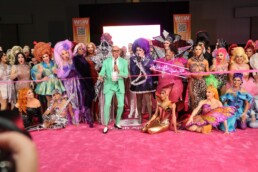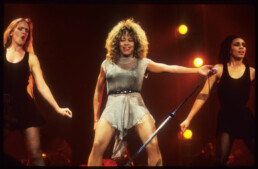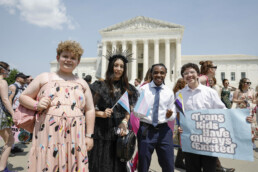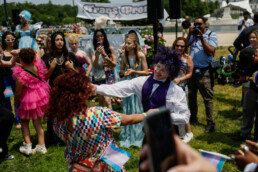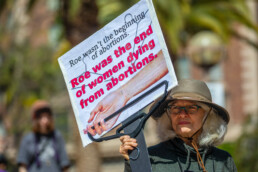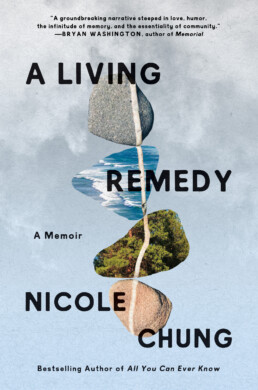Get Ducked, Greg Abbott
 June 6, 2023 Howdy, Meteor readers, I’m going to start this newsletter the same way I’ve been starting every conversation I’ve had since Sunday: Have you seen the new Spider-Man? Okay, hear me out before you scroll down to the adult conversation! This is not your average comic book superhero film. It is a moving, thoughtful, visual experience and an absolute feat in physical and racial diversity. I don’t want to spoil anything for anyone, but the Spiderverse literally has a Spider-person for everyone. I can honestly say that I haven’t left a theater on such a high since I saw Black Panther. Now that we’ve gotten that out of the way: In today’s newsletter, we’ve got more bans than we know what to do with—and, finally, some happy news from our AI overlords. (No, it’s not that they’ve thought twice about killing us). Spidey-sense tingling, Shannon Melero  WHAT'S GOING ONWhen transphobia backfires: I regret to inform all of you that Greg Abbott has Greg Abbott-ed once again: On June 2nd, the Texas governor signed into law a bill that bans gender-affirming care for trans kids, making Texas the 18th (and largest) state to do so. On its heels quickly followed a similar ban in Louisiana, once presumed dead but resurrected by Republican shenanigans. And it won’t be the last: seven other states are considering bans just like it. However, some recent court cases suggest that these bills’ rhetoric may work against them in the long run. US District Court Judge Robert Hinkle issued a preliminary injunction today against Florida’s brand-new ban, likely precluding its enforcement. Hinkle’s ruling directly cited “bigotry” (yes, he used the actual word! In a court document!) as part of the decision. He claimed the ban had “no rational basis” and referenced the moment when Rep. Webster Barnaby (R) called trans people “mutants” and “demons.” That kind of language actually pops up frequently in right-wing legislation: A recent ACLU lawsuit challenging Idaho’s gender care ban references several examples of bigotry from Idaho lawmakers, including likening trans people to “Frankenstein.” Journalist Erin Reed, who records many of these statements, tweeted that getting Republicans to “say the quiet part out loud” can be an effective tool for dismantling these bans in court. So keep telling us what you think lawmakers—it may be your undoing. As civil rights attorney Alejandra Caraballo pointed out, “Twitter talking points don’t hold up in court.” AND:

 This newsletter was brought to you by Shannon Melero and Bailey Wayne Hundl who would really love it if you filled out this reader survey. Thanks!  FOLLOW THE METEOR Thank you for reading The Meteor! Got this from a friend?
|
![]()
The Art and Joy of Drag
|
Helllloooo Meteor readers, Happy Pride! Or as it’s known in the retail world, Rainbow-Merch Month! How will you be celebrating this year? Attending a local family-friendly drag show like this one at my favorite doughnut place in New Jersey? Boycotting your nearest Target for pulling back on its Pride offerings? Or maybe you’re more into low-key celebrations and just want to curl up on the couch and watch the straights have a meltdown over gender-non-specific bathing suits while sipping a nice glass of wine.  Before we dive into today’s newsletter (which is a drag queen extravaganza) a bit of housekeeping first. We are SO appreciative to everyone who has filled out our reader survey thus far, and to answer a question quite a few of you have asked: Yes, this newsletter does accept pitches. So if you’ve got an idea, a story, or a song in your heart you can send it over to [email protected]. Today we’ve got debt and ceilings, plus an important message from Hayley Williams. Shannon Melero  WHAT'S GOING ONPay up: The Biden administration has reached an agreement on raising the debt ceiling and to be quite honest with you all, I was ignoring this bit of news because changing how debt works makes me feel like money is made up (which, in fact, it is). But one point’s worth discussing: The new deal reactivates student loan repayments—you know that thing that some of us have been spared for the last three years. The pause on student loans will end around September 1, and this time President Biden may not be able to swoop in last minute—as he did throughout the pandemic—and say, never mind pay it later. Why? Because now it’s essentially written in stone that in order to keep the rest of the imaginary money flowing for the rest of the country, borrowers will have to fork over their real money. Economics! There is still a shred of hope, though. Biden’s original debt forgiveness plan is still on the table, despite efforts to block it. The Supreme Court is set to decide this summer on the constitutionality of the plan, which could erase up to 20K for any borrower who is eligible for forgiveness. If the Robed Ones vote down the plan, then your lender will be in your inbox faster than my college ex after he heard I was hooking up with his nemeses. In the event you really can’t pay your loans back right now and you aren’t eligible for forgiveness, you can still keep hitting that defer button. AND:
 QUEEN SHITThe Art and Joy of DragBY ELLIE RUDY  RUPAUL AND QUEENS FROM THE 'DRAG RACE' FRANCHISE CUTTING THE RIBBON AT THIS YEAR'S DRAGCON. PHOTO COURTESY OF ELLIE RUDY Drag has had a tough year—the art form has been targeted by anti-LGBTQ+ groups and conservative legislators across the country. So on this first day of Pride, we turn to the epicenter of the drag universe: RuPaul’s DragCon. Writer, Ellie Rudy took a few laps around the Los Angeles Convention Center last month to find out what advice the wise and noble queens had to offer their community during another emotionally charged Pride month.  "In societies that may not necessarily be accepting of the trans community, I think it is important to stay with your tribe. Uplift and show support to each other." –Jasmine Kennedie, Drag Race Season 4 contestant “Be yourself, be true to you. If somebody doesn't like you because of who you are, then that's not a real friend, a real family member, or a real person even.” – The King of Queens, a 13-year-old queen from Los Angeles   “I think that people are often afraid of what they're not knowledgeable on. I think a lot of people who have fears about what we do simply don't educate themselves enough. Because once you do, you're gonna see that it's a beautiful, artistic, fun art form.” – Angeria Paris VanMichaels, Drag Race season 14 finalist “Don't take yourself too seriously. And especially if you're trying to start drag I think my most important advice is don't be afraid to be ugly. I feel like everyone wants to be so pretty right out the gate, but my ugly drag is my funnest stage of drag.” -Tenderoni, Chicago-based drag king   “I think it's important for us to keep living our truths, living authentically speaking up for one another, especially our trans brothers and sisters right now. They need us. And this noise, it's gonna fade into the background, because it's not really about us.” -Alexis Michelle (left), All Stars Season 8 contestant  Ellie Rudy was born and raised in Austin, Texas, and is the mother of a geriatric Chiweenie named Molly. She has written for LA Magazine, Teen Vogue, and more.  FOLLOW THE METEOR Thank you for reading The Meteor! Got this from a friend? Sign up for your own copy, sent Tuesdays and Thursdays.
|
![]()
The AI Overlords Are Coming For Us
 May 30, 2023 Happy Monduesday, Meteor readers, For some of us, today is a particularly tricky day. We are now two days removed from the series finale of “Succession” and, according to TV etiquette, it is allowable to discuss spoilers (apparently things are bad for the eldest boy??). However, some of us (me) are still a few episodes behind and would like for everyone to stop running their mouth like cousin Greg!  If you’re wondering why I’m so behind on the biggest show in town, it’s because I did something else this weekend: I went to an actual movie theater to watch The Little Mermaid. Reviews have been mixed, but when I tell you that Alan Menken put his whole menkussy into revamping this movie!! Halle Bailey’s performance brought me to tears three separate times. You must go see it. And if, like me, you have very strong thoughts about that one Lin-Manuel Miranda addition to the soundtrack, my DMs are open. In today’s newsletter we’re turning our attention to a surge in racism against athletes, the coming AI overlords, and the hawt summer we’re about to have. Still humming “Under the Sea,” Shannon Melero  WHAT'S GOING ON“Something I will continue to deal with”: During a post-match press conference yesterday, tennis star Sloane Stephens commented on the growing racism facing athletes, saying, “It has never stopped. If anything, it’s only gotten worse.” The data backs her up, alas: While racism in sports isn’t exactly a new phenomenon, a 2021 study showed a 200% increase in acts of racism in sports from 2019-2020. The most notable recent occurrence of this involved Spanish soccer team Real Madrid’s Vinicius Junior, who this month reported his tenth incident of racial abuse before the league he plays under (LaLiga) actively got involved—a move that only came to pass because of the immense success Vinicius has had since he started playing. But that let’s-try-to-fix-this energy isn’t as present in women’s sports, where there are only hundreds of thousands of eyeballs being drawn, vs the millions Vinicius commands. Despite the efforts of Althea Gibson (in the 1950s), the Williams sisters (in the ‘00s), and Naomi Osaka (now), the next generation of Black tennis stars are still fighting a Sisyphean battle. “Obviously it's been something that I have dealt with my whole career," Stephens said during the press conference. “It’s only continued to get worse…and something I will continue to deal with, I'm sure. That's that.” (If you're looking to show some support, Stephens' next match is tomorrow at 8:15 AM ET.) AND:

 THE METEOR IRLPlanning to be in New York next month? We'd love to see you at our next live event Say the Word: A Night of Art and Action for Trans Liberation on June 15th. Tickets are on sale now! Just click the image below to secure your seats. Can't make it to Joe's Pub? No worries! Why not let us know where you're from and where you'd like to see us put on an event by filling out this reader survey? You could win a Meteor tote!  FOLLOW THE METEOR Thank you for reading The Meteor! Got this from a friend?
|
![]()
Who Knew Tina Turner Was Also a Rugby Icon
 May 25, 2023 Greetings, Meteor readers, It’s hard to believe it, but an entire year has passed since the Uvalde school shooting, in which 19 elementary school children and two teachers were killed by an 18-year-old carrying two legally purchased assault rifles. Uvalde was the 212th mass shooting of last year. And the numbers have only gotten worse. According to the Gun Violence, Archive there have now been 241 mass shootings in 2023, which works out to 1.7 mass shootings per day so far this year. Meanwhile, the residents of Uvalde, Texas are still trying to heal from an unspeakable tragedy. To learn more about small actions you can take right now (literally right this second) to fight gun violence, check out this list from Everytown for Gun Safety. In today’s newsletter, we remember the icon Tina Turner and review some startling news about climate change. Doin’ the Nutbush, Shannon Melero  WHAT'S LOVE GOT TO DO WITH IT Yesterday, rock ‘n’ roll icon Tina Turner died at the age of 83 after what her representative described as a “long illness,” peacefully in her home in Switzerland. Turner was, without a doubt, one of the most talented musicians of our time—a larger-than-life persona synonymous with resilience, star power, and unmistakable, timeless music. That is the Turner we know. But behind the spotlight, Turner lived a surprisingly quieter life. Three unexpected facts about the woman behind the hits: She was a devout Buddhist: Tina Turner began practicing Nichiren Buddhism in 1973 after being introduced to it through friends. In later interviews, Turner credited her spiritual practice with giving her the strength to leave her abusive relationship with her first husband (who shall not be named). She even released a CD (remember those?) of interfaith chanting called Beyond: Buddhist and Christian Prayers. She was a sporting icon: Bet you didn’t see that one coming. Through a series of unexpected events, Tina Turner became the face and voice of an Australian rugby broadcast in the 80’s lending her hit songs to some (extremely homoerotic, if you ask me) 80s-esque commercials. (See for yourself, below.) James Dator, a reporter who grew up watching rugby during peak Tina time calls her involvement “a culturally significant moment for a nation that sparked the imagination. If a mega-star like Tina Turner could love rugby league and embrace Australia, then anyone can.” Her name wasn’t actually Tina: This one is for the youngsters who didn’t know who Tina Turner was until after the Angela Bassett movie. But Turner was actually born Anna Mae Bullock, a Sagittarius, and was given the stage name Tina by That Man. AND:

  ONE MORE THINGDo you have particularly strong feelings about this newsletter? We'd love to know what they are! Tell us absolutely everything by filling out our reader survey. You could win a Meteor tote!  FOLLOW THE METEOR Thank you for reading The Meteor! Got this from a friend?
|
![]()
Trans Teens Throw Epic Prom
  May 23, 2023 What’s up, Meteor readers? A hearty hello and good evening to everyone except my friend Brittany who got floor seats to Taylor Swift’s Eras Tour and did not spend the entire concert FaceTiming me. We are through. For today’s newsletter, the category is joy. Not just any joy: the unadulterated, vibrant joy of trans teens, adults, and allies dancing at a trans prom on the National Mall. The Meteor’s Mik Bean spoke to Daniel Trujillo, one of the youth organizers, about what the huge party was like. We’ve got that and some pleasant news out of Minnesota. Best believe I’m still bejeweled, Shannon Melero   WHAT'S GOING ONThe Little Senate That Could: Who’s ready for some good legislative news for a change? Democratic lawmakers in Minnesota gave us a perfect example yesterday of how to use a majority—no matter how slight. With only a one-seat edge in the Senate, they passed a whopping 884-page packet of sweeping reforms covering everything from abortion to suicide prevention. So strap in, Minnesotans and Minnesotan-adjacents, and let’s find out what Gemini season has gifted you this year:
Seriously, there’s so much in this thing that I’m not even scratching the surface. I’m barely even tickling it. And all this is on top of the other measures this slight majority had already passed this session: They effectively codified Roe v. Wade for the state. They passed a state-run paid family and medical leave program. They created new protections for Uber and Lyft drivers, leading to this too-cute scene celebrating the bill’s chief author. Oh, and weed will be completely legal by August 1; anyone previously convicted of misdemeanor possession will have their record automatically expunged. All that’s left for last night’s “billosaurus” is for Gov. Tim Walz to sign, and he’s spoken very highly of the move. It’s just wild how much of a difference lawmakers can make when they actually fight for the causes they care about. So congrats, Minnesota. Let’s hope the rest of the country can catch up. AND:
 CORSAGES AND CUMBERBUNDS“You Don’t Like Me? I’m Gonna Throw a Party in Front of Your Office Window.”Teens gather on the National Mall for Trans Youth PromBY MIK BEAN DON'T YOU WISH YOUR PROM WAS THIS MEANINGFUL? (PHOTO BY KISHA BARI) Yesterday, trans children and teenagers from across the country threw a prom on the National Mall, a youth-led public celebration of trans joy at a time when more and more states are adopting viciously anti-trans legislation. The Meteor’s Mik Bean spoke to Daniel Trujillo, 15, one of the event’s organizers, about the power a little party can have. Mik Bean: Of all the events you could think of to celebrate trans joy, what made you and your friends choose a prom? Daniel Trujillo: It stemmed from a lot of frustration me and other trans youth were feeling from continuously [having our existence debated]—and so publicly, too. Me and Libby [Gonzales] were on a call one day, and we were real angry. I was driving back from our state capitol from having to testify [on anti-trans legislation], and we were like, “What do we want to do about this problem?” And we were saying that we need, like, a joyous event. That's how it snowballed. There’s a lot of anti-trans legislation targeting trans youth in school specifically. We chose prom to be a statement of what schools could be like if trans youth were protected instead of being politicized in this really brutal way. Mik Bean is a writer and editor living online. They cover local politics, legal drama, and anything queer.  ONE MORE THINGDo you have particularly strong feelings about this newsletter? We'd love to know what they are! Tell us absolutely everything by filling out our reader survey. You could win a Meteor tote!  FOLLOW THE METEOR Thank you for reading The Meteor! Got this from a friend?
|
![]()
"You Don't Like Me? I'm Gonna Throw a Party in Front of Your Office Window."
StickyMay 23, 2023NEWS
BY MIK BEAN
On Monday, May 22nd, trans children and teenagers from across the country threw a prom on the National Mall, a youth-led public celebration of trans joy at a time when more and more states are adopting viciously anti-trans legislation. The Meteor’s Mik Bean spoke to Daniel Trujillo, 15, one of the event’s organizers, about the power a little party can have.
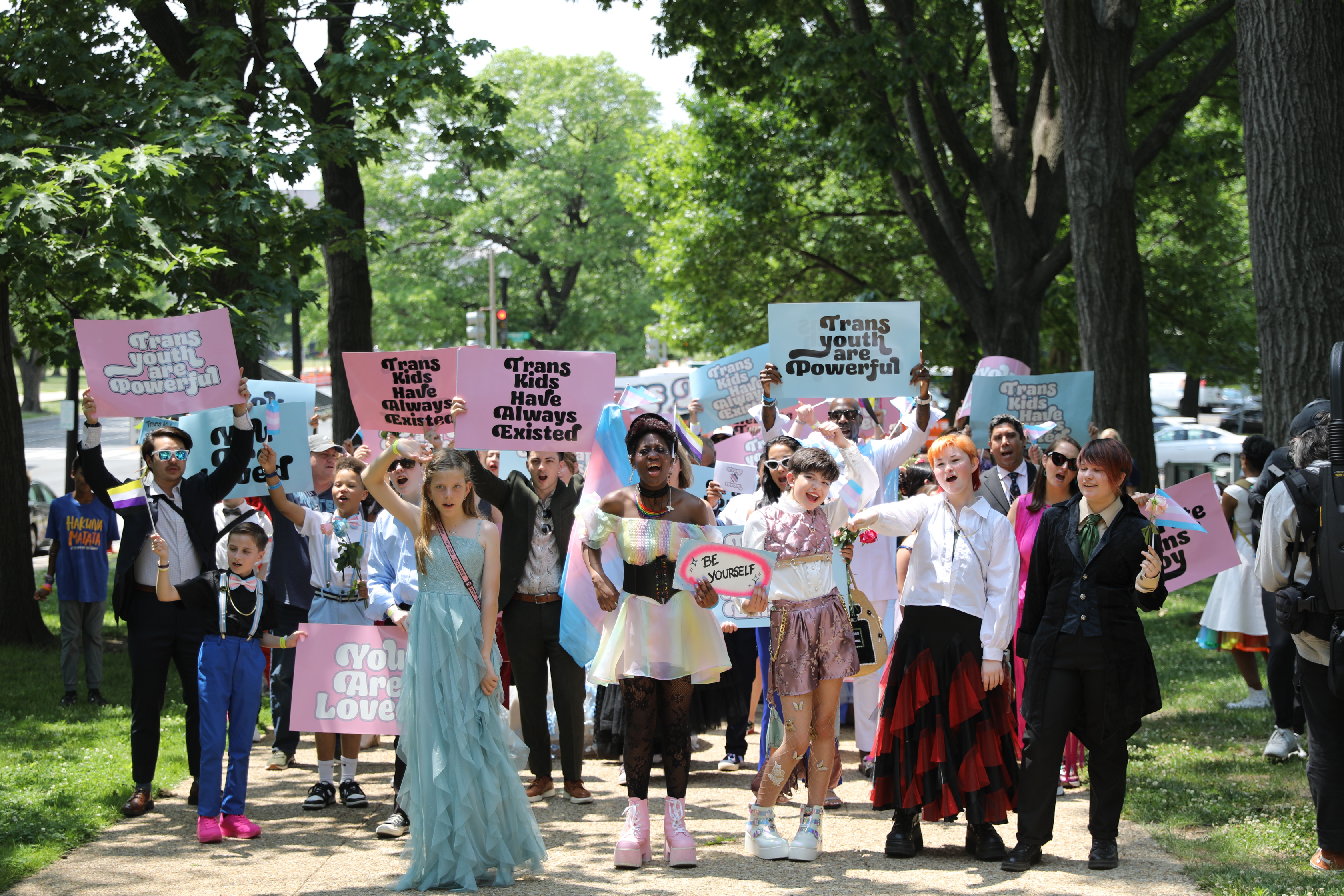
Mik Bean: Of all the events you could think of to celebrate trans joy, what made you and your friends choose a prom?
Daniel Trujillo: It stemmed from a lot of frustration me and other trans youth were feeling from continuously [having our existence debated]—and so publicly, too.
Me and Libby [Gonzales] were on a call one day, and we were real angry. I was driving back from our state capitol from having to testify [on anti-trans legislation], and we were like, “What do we want to do about this problem?” And we were saying that we need, like, a joyous event. That's how it snowballed.
There’s a lot of anti-trans legislation targeting trans youth in school specifically. We chose prom to be a statement of what schools could be like if trans youth were protected instead of being politicized in this really brutal way.
I love that it's a party, because the narrative that these transphobic legislators are telling is not a happy one. Are you hoping that holding this prom in a highly visible place like the National Mall will help change the conversation?
A lot of the anti-trans legislators have kids and grandkids of their own. I hope they all have this realization that we’re all kids who are just going to a prom and having fun, and that they see our joy and the commonalities between us [and] their own kids.
Part of me is kind of spiteful. It's like: “Hey, you don't like me, but guess what I'm gonna do? Throw a party right in front of your office window.”
I want the people [attending the event] to have this puzzle-click moment, this realization of: I have a lot of community here, and we might be in a really cruddy time right now, but it's not always gonna be like that. And because we had one really joyous day, I know that the rest of my life can be just as joyous. My parents run a parent support group in Arizona, and there's some younger children who go there who are, like, six, seven, eight years old, and some of them are gonna be at prom. I feel like it's going to be really amazing for them to see this.
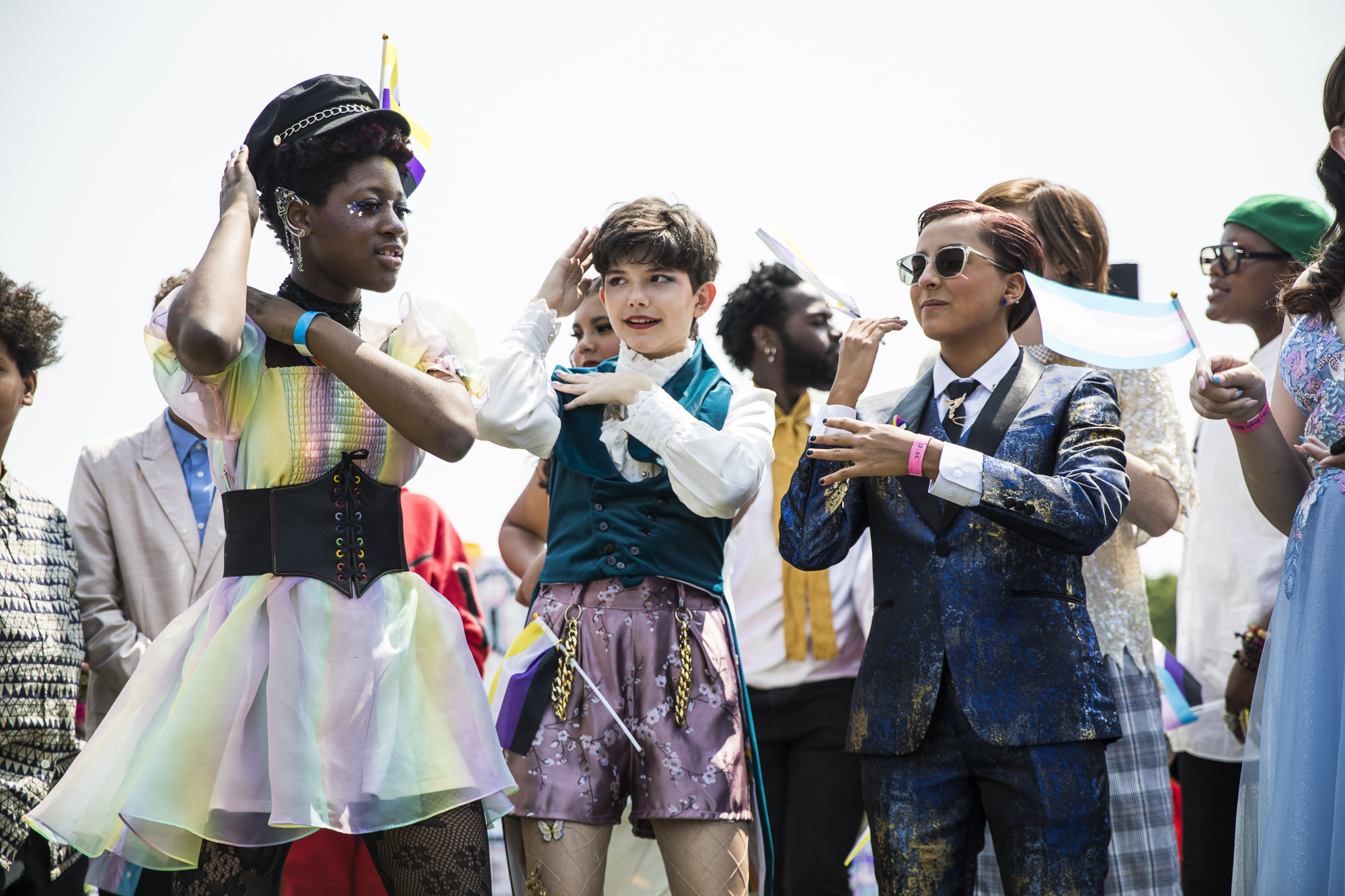
What is something all of us can do to make trans youth feel safe and joyful?
The main thing is to always listen to the youth. Create an affirming space by making sure that you're respecting their names and pronouns. And if those ever change, then make it a space where that’s not a big deal. Be really outspoken about your support of trans youth. A lot of people don't know about this movement against us.
Is there a moment you remember where someone did that for you?
Last year in the eighth grade, my history teacher at the start of class passed out a paper that asked: What’s your name? What’s your preferred name? Can I use this in front of your parents? What are your pronouns? Can I use these in front of your parents? Do you want to use this with the whole class or just privately? And even though this is the bare minimum, I was like, “This is so amazing. This is crazy. She's my favorite teacher. I love her so much.”
I love her, too. OK, back to the prom. What’s your number one dance song?
We made a Spotify playlist. I put some absolute bangers on there: “Dancing Queen,” ‘cause that's my song; “I Will Survive”—that's gonna be so fun; “Heroes” by David Bowie. I put Elton John on here. I also got Prince’s “I will Die for You.” That one is for my mom.
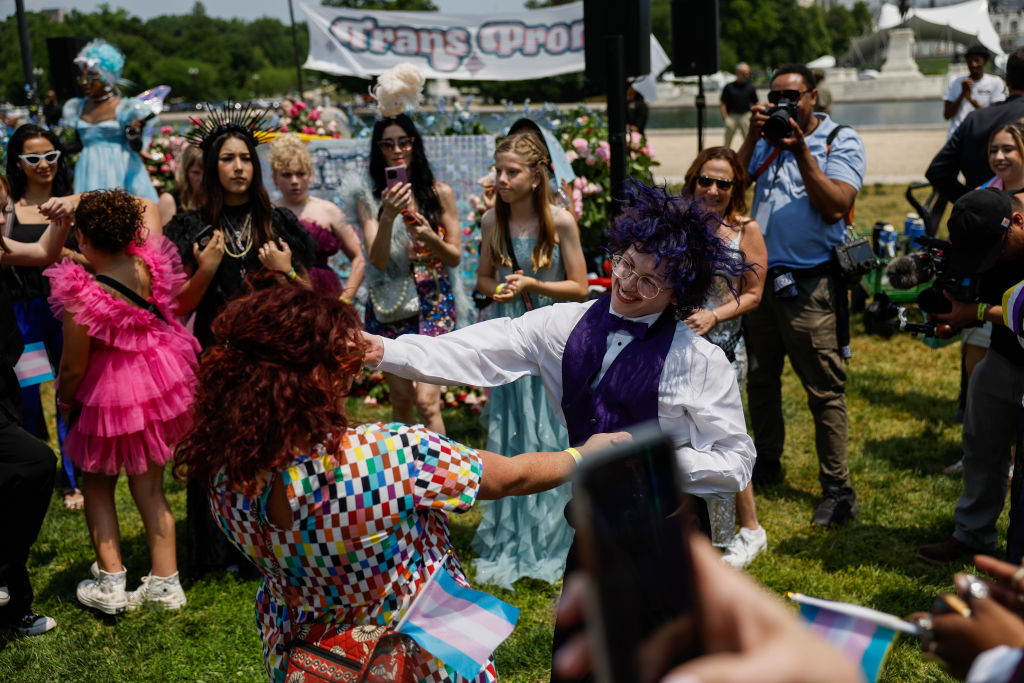
Bangers. Tell me about the outfit!
It is a black tuxedo with a white button-up shirt, and then a bowtie. We had to get it tailored because none of the clothes fit me right. But I got it tailored so the pants go above my ankle to show off my socks that say “Lord of the Strings.”
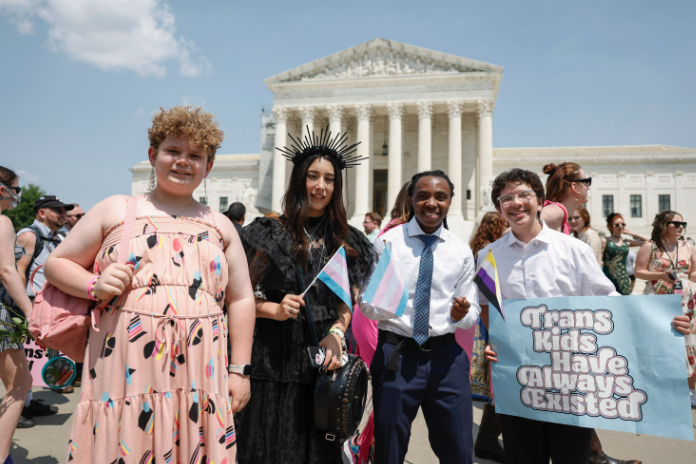
What is the story you want this prom to tell to trans youth about their futures?
That they're gonna be super happy. That they have a lot of community with them who's willing to fight for them. They’ll see this community with older trans people and have this understanding that…they don't need to be held to those statistics about [trans] life expectancy, you know? It's really important for me to have seen myself as a 35-year-old, a 40-year-old, even a 60-year-old. I know that we don't have to amount to those same statistics. We can change that narrative.
Trans youth and their families deserve the respect and dignity as any other family or person. We shouldn't be used as political tools.
The main thing that I would say is that we are heroes. We are beautiful.
Mik Bean is a writer and editor living online. They cover local politics, legal drama, and anything queer.
Florida's New Child Kidnapping Law
|
 May 18, 2023 Heeyyoooo Meteor readers, Friends! I’ve come back to you from the wilderness of maternity leave on this lovely Thursday to reclaim my ergonomic newsletter writing throne. Now I know what you’re thinking: What could possibly drag me away from my very cute child perched upon her Boppy? I think we all know the answer to that.  That’s right, I am here with a piping hot 2,000-word essay on Scandoval and its implications, not just on the reality TV landscape (which is now forever changed) but on the sixth wave of feminism, launched by Ariana Madix and Katie Maloney. Just kidding! I save those thoughts for the unhinged voice notes I send my friends late at night. In today’s newsletter, we’re talking about the WNBA, Gen Z’s contributions to feminist theory, and sports bras. But first, let’s get through This Week in GOP Tomfoolery. Shannon Melero P.S. It would be such a great welcome-back-to-work gift if you filled out this survey, all about how this newsletter can better serve you. More deets below!  WHAT'S GOING ONLet (straight) Kids Be Kids: Yesterday
During the signing ceremony, DeSantis celebrated his attempts to keep Florida “a refuge of sanity and a citadel of normalcy” (gross) behind a podium with a sign reading “Let Kids Be Kids.” But studies have found that providing trans youth with gender-affirming care strongly decreases the risk of suicide and depression. Let trans kids be trans, too—or they might not live to be adults. AND:

DEARICA HAMBY AND HER HAMBABIES. (SCREENSHOT VIA INSTAGRAM)
 TALK TO US, WIN A TOTEHelp us help you enjoy The Meteor even more than (we hope) you already do. Share your thoughts with us by filling out a brief survey and be entered to win a Meteor tote bag! Just click the button below to get started.  FOLLOW THE METEOR Thank you for reading The Meteor! Got this from a friend?
|
![]()
"There's literally nothing they could do"
 May 16, 2023 Hello hello, Meteor readers, Everyone wish a happy birthday to Bobi, the world’s oldest dog. Today he celebrates 217 (dog) years of being a very good boy—or 31 human years, if you don’t feel like doing the math. Today’s newsletter features a story we’ve got to stop becoming familiar with: a Texas woman forced to develop sepsis due to the state’s restrictive abortion ban. Plus, we’ve got Martha Stewart on Sports Illustrated, Planned Parenthood taking a stand, and Naomi Osaka shutting down some bullshit. Let’s get into it, Bailey Wayne Hundl  WHAT'S GOING ON A WOMAN PROTESTS FOR ABORTION ACCESS (PHOTO BY IRFAN KHAN/LOS ANGELES TIMES VIA GETTY IMAGES) “There’s literally nothing they could do”: Once again, Texas’ draconian abortion ban has caused a woman to develop sepsis. Last January, Kristen Anaya, a Texas resident, was elated to hear that her in-vitro fertilization had been a success. But only four months into her pregnancy, her water broke. Anaya rushed to the hospital, but, by the time she’d arrived, had lost nearly all of her amniotic fluid. She began shaking uncontrollably, vomiting, and spiking a fever—all signs of an infection that could lead to sepsis. But the doctors were unable to perform a dilation and curettage to help her; the baby’s heart was still beating. According to Anaya’s medical records, she went on to wait 22 hours before doctors were allowed to induce labor to deliver the unviable fetus. Medical personnel first had to contact the hospital’s termination committee—a team of hospital administrators who must approve any abortion care at the hospital—and build a case for the life-threatening nature of her pregnancy. “I was crying, asking for help,” Anaya told ABC News. “And I remember them literally not saying anything. [The doctors and nurses] would just literally look at me and look at Stephen and they’re just blank. There’s literally nothing they could do.” It’s now been one month since Anaya left the hospital. Since then, she has needed two dilation and curettage procedures to remove the placenta and stop her bleeding. Anaya says she is still experiencing pains and complications, as well as a still-dilated cervix. According to Dr. Aileen Gariepy, an OB/GYN and assistant professor at Weill Cornell Medical College, an early dilation and curettage could have more effectively removed the placenta while in the hospital and prevented further complications. It would be easy to write off these horrific—but increasingly common—scenarios as a Texas thing. That’s where Amanda Zurawski was subjected to similar treatment while losing her pregnancy last summer; she’s now joined four other women in suing the state for the harms caused to them by the state’s abortion bans. But this is now an America thing: A new report from researchers at the University of California San Francisco details dozens more health complications caused by abortion bans across the country—including a patient who was denied an abortion for a life-threatening ectopic pregnancy and another who developed a severe infection after leaving the hospital. “Medicine isn’t black and white,” said Daniel Grossman, the lead author of the report. “It’s not like suddenly you know that a patient is at a very high risk of dying in a certain situation. There’s a lot of gray and that risk will slowly change over time.”  RUDY GIULIANI DURING A REPUBLICAN GET OUT THE VOTE BUS TOUR (PHOTO BY MICHAEL M. SANTIAGO/GETTY IMAGES) AND:
 FOLLOW THE METEOR Thank you for reading The Meteor! Got this from a friend?
|
![]()
On Loving and Losing Your Adoptive Parents
BY REBECCA CARROLL
Nicole Chung on her new memoir A Living Remedy

PHOTO COURTESY OF NICOLE CHUNG
Nicole Chung has established herself as a queen of the literary memoir. Born to Korean immigrants and later adopted by a white couple in rural Oregon, Chung’s first memoir, All You Can Ever Know, chronicled her experience as a transracial adoptee, and the search for her remaining birth family in the United States. Now, her latest, A Living Remedy, published last month, is already garnering rave reviews. It tells the gut-wrenching story of losing her two adoptive parents back to back, in 2018 and 2020. As a transracial adoptee, I am moved and astonished by how Chung continues to expand on the adoption narrative (or the perception of it) in such succinct and generous ways. I sat down with her for The Meteor to talk about all of it.
Rebecca Carroll: In your new book, A Living Remedy, you contemplate whether or not you would have become a writer had you not been adopted. What is it about your experience as an adoptee that made you become a writer?
Nicole Chung: Maybe you’ll relate to this as an adoptee and a storyteller, but you're always telling that formative story over and over whether you feel like talking about it or not. There were certainly many years when I didn't want to share it or tried to find ways to share less of it. But even with the original story my adoptive parents told me about my adoption, which I later learned wasn't quite the truth, I was always struck by the power that can be found in retelling or reclaiming a story, if you're willing and brave enough to reconsider it.
RC: It makes me think that as adoptees, we are constantly trying to write our identities into existence. When did you know that you were going to become not just a writer, but a writer of such personal stories?
NC: I grew up not seeing anything like my experience in literature. Even stories written about adoption where it's a plot point, I often find bears little to no resemblance to my experience. And it's hard because I was very worried about, and honestly still am, being pigeonholed as this Korean adoptee writer. At the same time, it felt as though I had to write the first book [All You Can Ever Know] before I could write anything else. I just needed to see something like myself in literature to write more of it.
RC: There are moments throughout A Living Remedy where you say, “as an adoptee…”—and every single time I read that, it was thrilling because it felt like you were writing directly to me, while also expanding the adoptee narrative. Were you writing to fellow adoptees specifically?
NC: With my first book every time I started to lose my nerve or just think, “This is beyond me. I can't tell this story,” or “Who will care?” I thought about fellow adoptees, and that is what kept me going. A Living Remedy is completely different. It’s not that I didn't think about the wider audience with All You Can Ever Know—unlike some people in publishing, I was always convinced there was an audience for adoptee stories. A Living Remedy scared me, though, because it is just a much broader book. I'm writing about many things people call universal when white writers do it—grief, loss, illness. But because of my identity, I did wonder, will I be allowed to do this?
RC: Your main subjects, though, your parents, are white—how did that factor in?
NC: The story of my family until me is very much a white working-class story. But to be in the family and not have that same experience was one of the things that I wanted to write about, while not making either my race or my parents' race the focus. An interviewer asked me recently if my parents being white made me feel distant from them or their financial hardship, and I just didn't know how to respond. In every way, I thought of them as my parents, except for the basic biological facts. So, of course, I always felt I was part of their experience.

PHOTO COURTESY OF NICOLE CHUNG
RC: There’s a passage in the book when you’re in college, about to get married, and your mother accuses you of being embarrassed by them—she says you just see her and your dad as “poor white trash,” which took you off guard. How did you see them?
NC: I thought of them as my parents. I thought of them as the people who loved and raised me. I was just beginning to understand the educational and class differences that might happen. I think this is part of almost everybody's coming-of-age story, where you learn to see your parents as whole people, not just your parents. The changing nature of that parent-child relationship is a big part of the book, partly because of the caregiving role I had to step into when both my parents were ill.
RC: In one instance, you describe college as stepping into a foothold that your parents couldn't follow you into—what did you mean by that?
NC: I had never been away from my parents, where I grew up in this small town in Oregon for longer than a month at summer camp. I wasn't thinking about the fact that they couldn't go with me, or that if I gained education and class privilege, that I wouldn't be able to bring them with me. I was still thinking, “If I make it, they make it.” Of course, I had my own ambition, things that I wanted and hoped for, but I very much thought of myself as doing this for my family.
RC: Where did that ambition come from? Because you could have just stayed in the town.
NC: Oh, no, I could not have. After my first book came out, someone who had gone to my same church said, “I read your book. It was interesting. That's just not really what I think our community was like for me.” And I said, “Well, of course it wasn't like that for you. You are a white guy. There's a reason that you and I had very different experiences in that community.” Honestly, not to sound dramatic, I thought it might kill me if I stayed.
RC: How do you feel now about the place where you grew up?
NC: There are beautiful things about it…but it's not home. I never really belonged there, and I know that. I would rather not give racism this power in my narrative, but it's true that as soon as I started hearing slurs on the playground, I started thinking about leaving. I think also it was my parents, and especially my mother, who prepared me to go.
RC: I was so struck by your relationship with your mother, and the resolute way in which you write about her love—what have you brought of her mothering to your own?
NC: She was a very devout woman. Her deepest faith was in God. But after that, she had so much faith in me as her child. It's not like our relationship was perfect. It was very complicated. Adoption was one of many things that complicated it. But I never doubted her love or her faith in me. And I think that made me braver than I would've been otherwise. If I can bring anything of her parenting to mine, that's what I think about the most. I want my kids to grow up with that sense of reassurance.

RC: In the book, you use the term “unadopted” to describe what it felt like, in part, to lose both your adoptive parents—can you say more about that?
NC: I'm not sure it's the term that I'd use now to describe my current state. But my mother was dying—my last link, the last person who knew me as a child or remembered what it was like for me growing up. It was just sinking in that I was going to be carrying these memories of my parents and my grandparents, all alone in a sense. What does it even mean to have lost two families—to have lost one family through adoption, and then the one that adopted me? What does it mean to be an adoptee when your adopted family is gone?
RC: If not unadopted, then what?
NC: I am still an adoptee. That will always be part of who I am. My parent’s love for me will always shape who I am. I was then and still am really sad that my time belonging to that family is over, and there's no getting it back. There's no finding it with other people. It's just over.
RC: How do you bear it?
NC: I think there was a time when I wasn't bearing it. I remember just this deep depression I fell into after my father died, and there were echoes of that when my mother was dying. Just the helplessness and the rage, and it felt unbearable. [But] I knew that by living, I could remember [my parents]. It finally became more important to me to be able to live and remember them than to live, punishing myself for what I couldn't do for them. And I think that's still how I bear it, because when I was able to do that and grieve in that way, they felt close again.
Why did CNN basically host a Trump rally?
 May 11, 2023 Happy Bey Day, Meteor readers, Last night was a huge spectacle, and no, I’m not talking about Trump’s CNN town hall—though more on that below. I’m talking about the first night of Beyoncé’s “Renaissance” tour: the sexy bee outfit, the enormous disco horse statue, and, of course, the loving homage to Black ballroom culture.  LIKE, COME ON! LOOK AT HER! (PHOTO BY KEVIN MAZUR/GETTY IMAGES FOR PARKWOOD) In today’s newsletter, Rebecca Carroll sits down with Nicole Chung to discuss her new memoir about adoption and loss. But first, the news. Desperately clamoring for tickets, Bailey Wayne Hundl  WHAT'S GOING ON
 MEGAN THEE STALLION SHOWING UP TO COURT TO TESTIFY IN THE TRIAL OF TORY LANEZ (PHOTO BY JASON ARMOND/LOS ANGELES TIMES VIA GETTY IMAGES)
 CULTURE CHANGERSOn Loving and Losing Your Adoptive ParentsBY REBECCA CARROLLNicole Chung on her new memoir A Living Remedy  PHOTO COURTESY OF NICOLE CHUNG Nicole Chung has established herself as a queen of the literary memoir. Born to Korean immigrants and later adopted by a white couple in rural Oregon, Chung’s first memoir, All You Can Ever Know, chronicled her experience as a transracial adoptee, and the search for her remaining birth family in the United States. Now, her latest, A Living Remedy, published last month, is already garnering rave reviews. It tells the gut-wrenching story of losing her two adoptive parents back to back, in 2018 and 2020. As a transracial adoptee, I am moved and astonished by how Chung continues to expand on the adoption narrative (or the perception of it) in such succinct and generous ways. I sat down with her for The Meteor to talk about all of it. Rebecca Carroll: In your new book, A Living Remedy, you contemplate whether or not you would have become a writer had you not been adopted. What is it about your experience as an adoptee that made you become a writer? Nicole Chung: Maybe you’ll relate to this as an adoptee and a storyteller, but you're always telling that formative story over and over whether you feel like talking about it or not. There were certainly many years when I didn't want to share it or tried to find ways to share less of it. But even with the original story my adoptive parents told me about my adoption, which I later learned wasn't quite the truth, I was always struck by the power that can be found in retelling or reclaiming a story, if you're willing and brave enough to reconsider it. RC: It makes me think that as adoptees, we are constantly trying to write our identities into existence. When did you know that you were going to become not just a writer, but a writer of such personal stories? NC: I grew up not seeing anything like my experience in literature. Even stories written about adoption where it's a plot point, I often find bears little to no resemblance to my experience. And it's hard because I was very worried about, and honestly still am, being pigeonholed as this Korean adoptee writer. At the same time, it felt as though I had to write the first book [All You Can Ever Know] before I could write anything else. I just needed to see something like myself in literature to write more of it. RC: There are moments throughout A Living Remedy where you say, “as an adoptee…”—and every single time I read that, it was thrilling because it felt like you were writing directly to me, while also expanding the adoptee narrative. Were you writing to fellow adoptees specifically? NC: With my first book every time I started to lose my nerve or just think, “This is beyond me. I can't tell this story,” or “Who will care?” I thought about fellow adoptees, and that is what kept me going. A Living Remedy is completely different. It’s not that I didn't think about the wider audience with All You Can Ever Know—unlike some people in publishing, I was always convinced there was an audience for adoptee stories. A Living Remedy scared me, though, because it is just a much broader book. I'm writing about many things people call universal when white writers do it—grief, loss, illness. But because of my identity, I did wonder, will I be allowed to do this? RC: Your main subjects, though, your parents, are white—how did that factor in? NC: The story of my family until me is very much a white working-class story. But to be in the family and not have that same experience was one of the things that I wanted to write about, while not making either my race or my parents' race the focus. An interviewer asked me recently if my parents being white made me feel distant from them or their financial hardship, and I just didn't know how to respond. In every way, I thought of them as my parents, except for the basic biological facts. So, of course, I always felt I was part of their experience.  PHOTO COURTESY OF NICOLE CHUNG RC: There’s a passage in the book when you’re in college, about to get married, and your mother accuses you of being embarrassed by them—she says you just see her and your dad as “poor white trash,” which took you off guard. How did you see them? NC: I thought of them as my parents. I thought of them as the people who loved and raised me. I was just beginning to understand the educational and class differences that might happen. I think this is part of almost everybody's coming-of-age story, where you learn to see your parents as whole people, not just your parents. The changing nature of that parent-child relationship is a big part of the book, partly because of the caregiving role I had to step into when both my parents were ill. RC: In one instance, you describe college as stepping into a foothold that your parents couldn't follow you into—what did you mean by that? NC: I had never been away from my parents, where I grew up in this small town in Oregon for longer than a month at summer camp. I wasn't thinking about the fact that they couldn't go with me, or that if I gained education and class privilege, that I wouldn't be able to bring them with me. I was still thinking, “If I make it, they make it.” Of course, I had my own ambition, things that I wanted and hoped for, but I very much thought of myself as doing this for my family. RC: Where did that ambition come from? Because you could have just stayed in the town. NC: Oh, no, I could not have. After my first book came out, someone who had gone to my same church said, “I read your book. It was interesting. That's just not really what I think our community was like for me.” And I said, “Well, of course it wasn't like that for you. You are a white guy. There's a reason that you and I had very different experiences in that community.” Honestly, not to sound dramatic, I thought it might kill me if I stayed. RC: How do you feel now about the place where you grew up? NC: There are beautiful things about it…but it's not home. I never really belonged there, and I know that. I would rather not give racism this power in my narrative, but it's true that as soon as I started hearing slurs on the playground, I started thinking about leaving. I think also it was my parents, and especially my mother, who prepared me to go. RC: I was so struck by your relationship with your mother, and the resolute way in which you write about her love—what have you brought of her mothering to your own? NC: She was a very devout woman. Her deepest faith was in God. But after that, she had so much faith in me as her child. It's not like our relationship was perfect. It was very complicated. Adoption was one of many things that complicated it. But I never doubted her love or her faith in me. And I think that made me braver than I would've been otherwise. If I can bring anything of her parenting to mine, that's what I think about the most. I want my kids to grow up with that sense of reassurance.  RC: In the book, you use the term “unadopted” to describe what it felt like, in part, to lose both your adoptive parents—can you say more about that? NC: I'm not sure it's the term that I'd use now to describe my current state. But my mother was dying—my last link, the last person who knew me as a child or remembered what it was like for me growing up. It was just sinking in that I was going to be carrying these memories of my parents and my grandparents, all alone in a sense. What does it even mean to have lost two families—to have lost one family through adoption, and then the one that adopted me? What does it mean to be an adoptee when your adopted family is gone? RC: If not unadopted, then what? NC: I am still an adoptee. That will always be part of who I am. My parent’s love for me will always shape who I am. I was then and still am really sad that my time belonging to that family is over, and there's no getting it back. There's no finding it with other people. It's just over. RC: How do you bear it? NC: I think there was a time when I wasn't bearing it. I remember just this deep depression I fell into after my father died, and there were echoes of that when my mother was dying. Just the helplessness and the rage, and it felt unbearable. [But] I knew that by living, I could remember [my parents]. It finally became more important to me to be able to live and remember them than to live, punishing myself for what I couldn't do for them. And I think that's still how I bear it, because when I was able to do that and grieve in that way, they felt close again.  Rebecca Carroll is a writer, cultural critic, and podcast creator/host. Her writing has been published widely, and she is the author of several books, including her recent memoir, Surviving the White Gaze. Rebecca is Editor at Large for The Meteor. FOLLOW THE METEOR Thank you for reading The Meteor! Got this from a friend?
|
![]()



